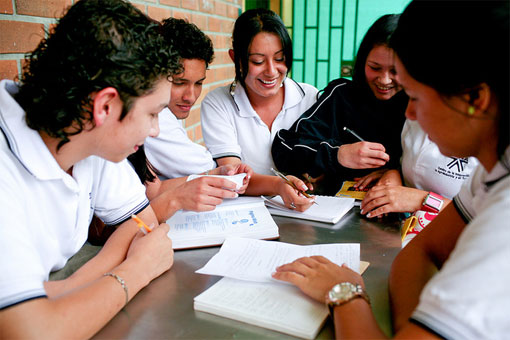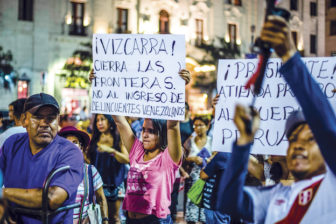Youth unemployment rates are near 20 percent in some areas of Peru, and not coincidentally, gang activity also is on the rise. It is a situation that cannot be ignored and one which President Ollanta Humala pledged to address during the campaign.
His solution: combat gangs by promoting job training. This August, just weeks after his inauguration, Humala introduced two new programs—Trabaja Perú (Peru Works) and Jóvenes a la Obra (Youth Get to Work)—to begin to address the official 14 percent youth unemployment rate. The programs have the much needed goals of encouraging training and entrepreneurship and connecting young workers to labor markets.
On September 13, the president once again demonstrated his commitment to Trabaja Perú at the formal launch of the program in Lima: “That’s what we have to do, generate jobs, generate dignity and respect among people.” At the ceremony, Humala noted that the program will create jobs in 195 provinces with emphasis given to those in the lowest income quintile. Minister of Labor and Employment Promotion Rudecindo Vega has said that Trabaja Perú will benefit 5 million Peruvians (300,000 jobs by 2012) with employment opportunities building much-needed infrastructure.
The programs have the right goals in mind, and in some respects, they are similar to ProJoven, a program that has provided free vocational training to over 40,000 low-income youth for the past 10 years. But there is more to be done.
In February 2011 then-president of the Peruvian Congress, César Zumaeta Flores of the Alianza Popular Revolucionaria Americana (APRA) party, introduced the Promoción del Empleo Juvenil bill. The legislation was an attempt to promote employment and protect workers’ rights for Peruvians age 15–24.
The law would have required domestic and international companies to provide young workers benefits such as health care, overtime pay, vacation time, and a 48-hour work week. It also proposed the creation of a government-led vocational training school to be developed in collaboration with the private sector, which would offer school credit for on-the-job experience and provide students with skills certificates under the auspices of the Ministry of Labor (Compensación por Tiempo de Servicio—CTS). Another provision would have included payroll subsidies for companies that hire young people. Although Zumaeta lost his re-election bid, the new Congress should consider re-introducing parts or all of the legislation.
The legislation is timely and would complement President Humala’s other youth employment efforts. Such legislation would enshrine protections for young workers and youth employment promotion in law.
A Law vs. a Social Program
The Promoción del Empleo Juvenil measure stems from domestic and international norms. Domestically, the bill uses fundamental principles from past legislation (Acuerdo Nacional, Ley Orgánica del Poder Ejecutivo, Ley del Ministerio de Trabajo, Lineamientos Nacionales de Política de la Formación Profesional) that focus on the general rights of workers and applies them to young people.
Internationally, it attempts to address the UN Millennium Development Goals (MDGs)—specifically the first MDG on workers’ rights, which states the goal to “achieve full and productive employment and decent work for all—including women and young people.” And it reflects the International Labor Organization’s (ILO) Western Hemisphere Agenda for 2006–2015, entitled “Decent Work in the Americas.”
The law’s foundation is important because it contextualizes the bill in a “rights-based” framework and not solely in terms of new public expenditures and programs. Existing youth employment programs don’t guarantee that youths’ rights will be respected on the job. They may serve as a mechanism for employment, but not necessarily “dignified” employment. The new law would provide protections if their rights are violated.
Given the emergence of programs like Trabaja Perú and Jóvenes a la Obra, some may question whether actual youth employment legislation is necessary. But social programs and rights-based laws are complementary; each addresses the same problem but through different objectives. If the Promoción del Empleo Juvenil bill passes, young people would receive not just opportunities for vocational training, but also legal protections from exploitation.
Limitations in the Law
While Promoción del Empleo Juvenil would represent a step toward protecting young people, it does have several limitations. For one, Peruvian law considers anyone between the ages of 15–29 to be “young.”1 This means that the bill (which only covers those age 15–24) excludes individuals who are otherwise considered “youth.”
There is also no guarantee that companies would hire young workers. If enacted, firms may be even more reluctant to hire young workers because they would have to pay a higher wage, provide benefits and vacation time. While the proposed payroll subsidies may act as an incentive to hire youth, the proposed incentives may not cover firms new perceived costs of hiring young workers.
What’s more, the law would only apply to the private sector. But 16 percent of Peruvian workers are in the public sector. The government’s exemption under the law sets an odd precedent.
Perhaps the most pressing limitation is that most young people work in informal jobs because they are unable to find formal work. More than half of Peru’s labor force works informally. None of these programs or laws address the underlying problem of the need to formalize the informal sector, which would entail huge costs and require genuine structural reform.
Still, despite drawbacks, the bill would be a first step to provide greater opportunities and protections for young workers. With the launch of Trabaja Perú this week, now is the time to focus on protecting young workers’ rights in addition to helping them get back to work.
1 Ley 27802 CONAJU (Consejo Nacional de la Juventud)








